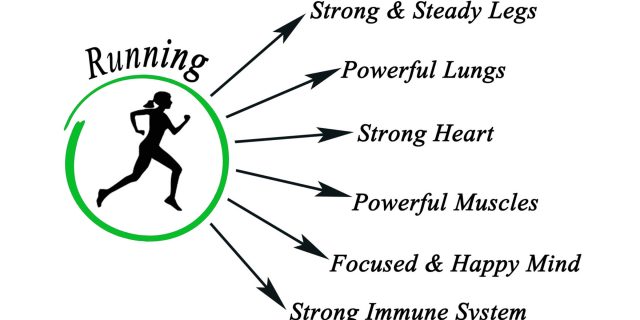Exploring the Comprehensive Health Benefits of Running
Introduction
Running, a simple yet potent form of exercise, has captivated people of all ages and fitness levels for generations. It requires minimal equipment, can be enjoyed nearly anywhere, and offers a myriad of health benefits. In this in-depth exploration, we will delve into the extensive array of health advantages that running provides, dissecting how this activity contributes to overall physical, mental, and emotional well-being.
What Is Running?
Running, at its core, is a fundamental human movement—a symphony of controlled chaos that propels us forward with grace and power. It is defined by a series of rhythmic strides that momentarily lift us off the ground during each step, creating a continuous, fluid motion. This innate ability to run is deeply ingrained in our evolutionary history, allowing us to hunt, escape predators, and explore our world.
Health Benefits of Running
Running is a holistic endeavor, offering a multitude of health benefits that span multiple dimensions of well-being. Here, we’ll delve into these advantages, exploring how running positively impacts our physical, mental, and emotional health.
1. Improved Cardiovascular Health
FAQ: How does running improve cardiovascular health?
- Running is a dynamic cardiovascular exercise that engages the heart, reducing resting heart rate and enhancing blood circulation. Over time, it can significantly reduce the risk of heart diseases such as heart attacks and strokes.

2. Weight Management and Fat Loss
FAQ: Can running help with weight management?
- Absolutely. Running is a potent calorie-burning activity that aids in weight management and fat loss. It creates a calorie deficit, a key component of shedding excess body fat.

3. Enhanced Lung Function
FAQ: Does running improve lung function?
- Yes, it does. Running involves controlled, deep breathing, which can lead to improved lung capacity and efficiency. This, in turn, enhances respiratory health and boosts oxygen supply to the body.
4. Stronger Muscles and Bones
FAQ: How does running benefit musculoskeletal health?
- Running is a weight-bearing exercise that strengthens muscles, bones, and joints. It can help prevent conditions like osteoporosis and osteoarthritis, contributing to overall musculoskeletal health.
5. Mental Well-Being and Stress Reduction
FAQ: Can running have positive effects on mental health?
- Absolutely. Running has the power to release endorphins, natural mood lifters, which reduce stress, anxiety, and symptoms of depression. It promotes overall mental well-being.
6. Enhanced Cognitive Function
FAQ: How does running benefit cognitive function?
- Running has been correlated with improved cognitive function, including better memory, attention, and problem-solving skills. There’s even evidence suggesting it may reduce the risk of cognitive decline in older adults.
7. Boosted Immune System
FAQ: Can running boost the immune system?
- Yes, regular running can fortify the immune system’s ability to fend off infections and illnesses, reducing both their frequency and severity.
8. Better Sleep Quality
FAQ: Does running improve sleep quality?
- Indeed, it does. Running helps regulate sleep patterns and can lead to better sleep quality. It promotes deeper and more restful sleep, leaving you feeling refreshed and energized.
9. Increased Longevity
FAQ: Can running contribute to a longer life?
- Research has indicated that individuals who engage in regular running tend to enjoy longer life spans and a reduced risk of premature death from various causes.
10. Stress Relief
FAQ: How does running relieve stress?
- Running serves as an effective stress outlet by facilitating the release of endorphins and providing a mental respite. It allows individuals to clear their minds and focus on the present moment.
11. Social Connection and Community
FAQ: Can running foster social connections?
- Absolutely. Running clubs, group races, and online communities offer a sense of belonging and support, enhancing social well-being and motivation.
12. Increased Self-Confidence and Empowerment
FAQ: How does running boost self-confidence?
- Achieving running goals, whether completing a 5k or a marathon, can instill a sense of accomplishment and self-worth. This empowerment transcends into other areas of life.
13. Creativity and Mindful Reflection
FAQ: Can running enhance creativity and reflection?
- Yes, it can. Running provides a unique opportunity for introspection and creative thinking. Many find their best ideas emerge during a long run.
14. Weight-bearing Benefits for Bone Health
FAQ: Does running help with bone health?
- Running, as a weight-bearing exercise, encourages bone density. It is particularly advantageous for women at risk of osteoporosis.
15. Improved Metabolism
FAQ: How does running affect metabolism?
- Running can rev up your metabolism, helping your body burn calories more efficiently and aiding in weight management.
16. Enhanced Mood Regulation
FAQ: Can running help regulate mood?
- Yes, running stabilizes mood by regulating neurotransmitters like serotonin and norepinephrine, leading to a more balanced emotional state.
Overcoming Common Running Challenges
FAQ: What are some common challenges people face when starting to run?
- Common challenges include injury risk, motivation fluctuations, and finding the right running routine. It’s essential to start slowly, listen to your body, and seek guidance if needed.
Preparing for a Safe and Enjoyable Running Experience
FAQ: How can I ensure a safe and enjoyable running experience?
- To ensure safety and enjoyment, invest in appropriate running shoes, warm up before each run, and gradually increase your mileage. Hydration and proper nutrition are also crucial.
Conclusion
Running is a dynamic, versatile, and accessible form of exercise that offers a vast spectrum of health benefits. From cardiovascular health and weight management to mental well-being and stress reduction, the positive impacts of running on physical and mental health are well-documented. Whether you’re a seasoned runner or just starting, incorporating running into your fitness routine can contribute significantly to your overall well-being, longevity, and quality of life.
Remember to consult with a healthcare professional before embarking on a new exercise program, especially if you have any underlying health conditions or concerns. With dedication, patience, and a pair of reliable running shoes, you can harness the myriad benefits of running to lead a healthier, happier life.










